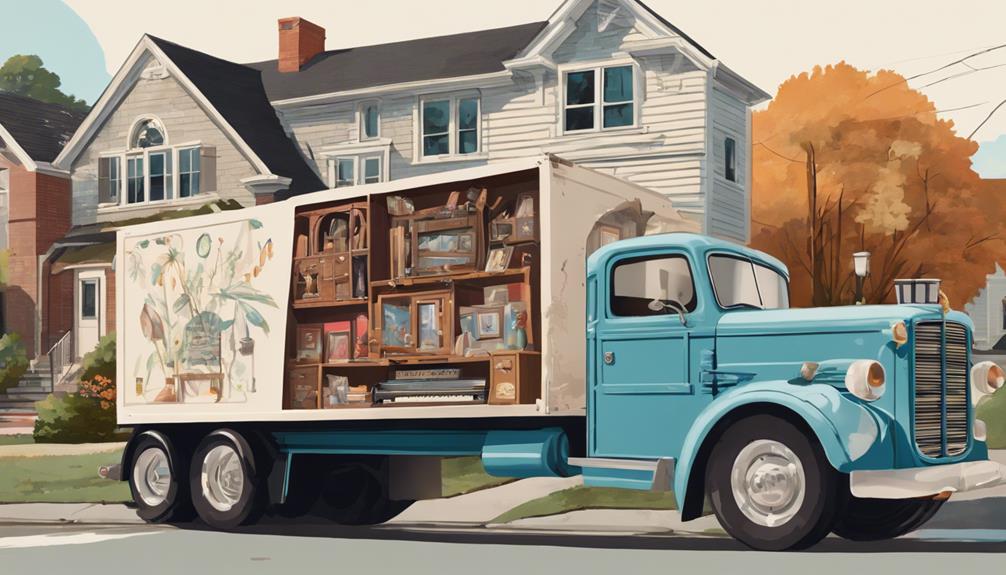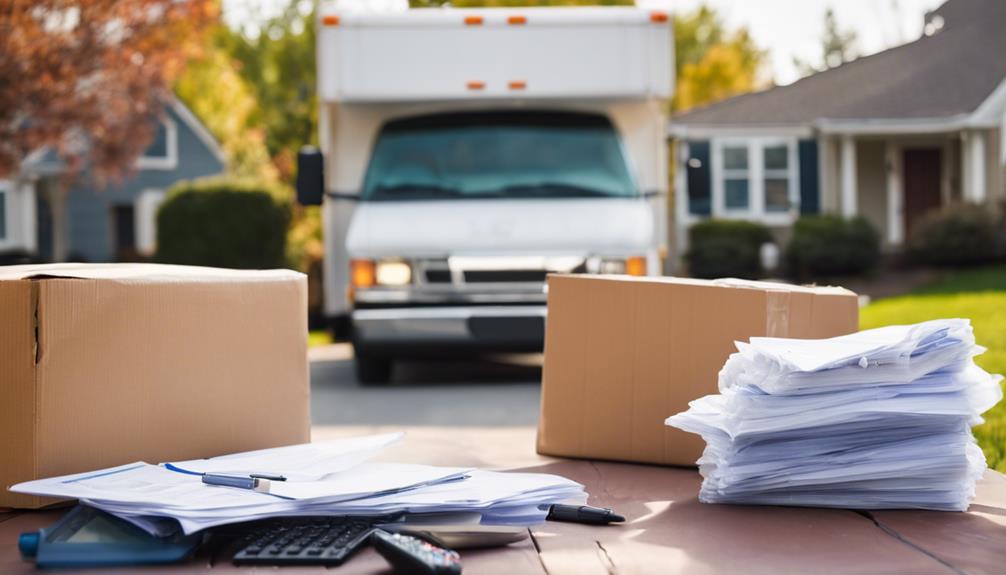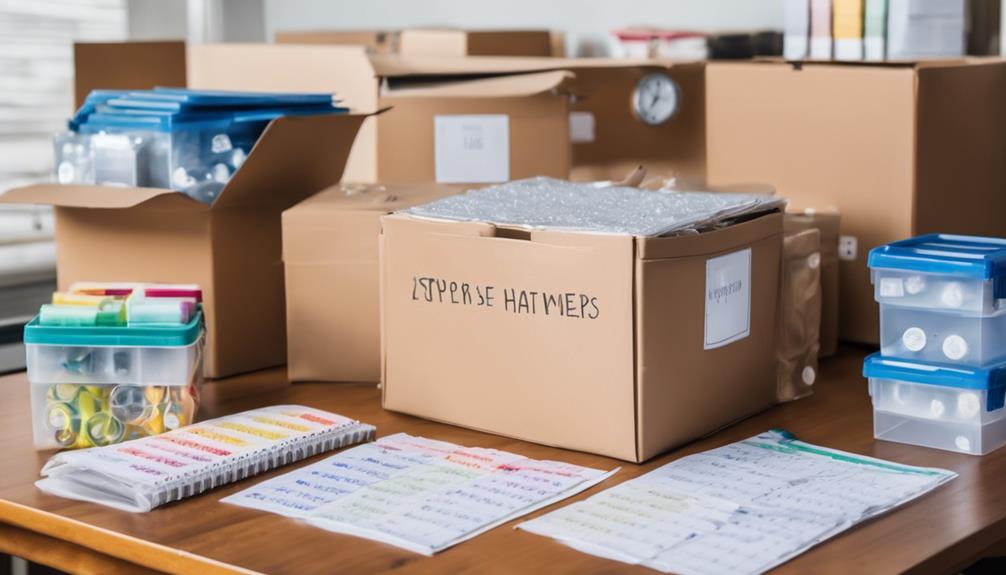Specialty moving is all about the careful transport of unique items, like antiques, pianos, and artwork. These valuable belongings need specialized handling, which means using trained professionals who know how to protect fragile items. They use custom packing materials and techniques to reduce damage risks. You’ll also want to get insurance that covers your possessions during transit. Planning ahead is important, so make a detailed inventory of what needs extra care. Clear communication with your moving company can help ensure a smooth process. Keep exploring to learn more about preparing for your specialty move and what to expect on moving day.
Understanding Specialty Moving

Specialty moving involves the careful transportation of unique items like antiques, artwork, and pianos that need specialized handling. When it comes to your valuable possessions, understanding specialty moving needs is crucial. You don’t want just any moving company; you need professional moving services that specialize in these delicate tasks.
Specialty moving companies employ highly trained staff who know how to manage fragile items and ensure they arrive safely at your new location. These experts use custom packing materials and techniques designed for large and delicate items, minimizing the risk of damage during transit.
They also handle the logistics involved in moving difficult-to-move items, making the process smoother for you. Effective communication with these movers about the specific requirements of your unique items enhances the overall experience.
Whether you’re relocating a grand piano or priceless artwork, special care is needed at every step of the journey.
Identifying Specialty Items
When you’re preparing to move, it’s essential to identify specialty items that need extra care.
These can range from large and heavy objects like pianos and pool tables to fragile pieces such as fine art and antique furniture.
Types of Specialty Items
Identifying specialty items is crucial for ensuring a smooth moving experience. When you think of moving specialty items, consider large and heavy objects like pianos, pool tables, and appliances such as refrigerators. These bulky items often require multiple individuals to ensure safe transport.
You also need to pay attention to fragile items, including antique furniture, fine art, and glassware, as they need careful handling to prevent damage.
Don’t overlook high-value possessions, like musical instruments—think harps and grand pianos—or collectibles that demand specialized packing techniques. Large electronics, such as flat-screen TVs, may also require unique moving methods due to their size and fragility.
Specialty moving services can help with all these unique items. They employ specialized movers who are trained to handle various challenges that come with transporting boats and automobiles.
Assessing Item Fragility
Recognizing the importance of careful handling for specialty items leads directly to assessing their fragility. When you’re preparing to move, it’s crucial to identify fragile items among your possessions. These often include high-value possessions like fine art, antiques, and glassware, which need extra attention during transport.
Assessing item fragility means considering both the material composition and the intrinsic value of your belongings. For instance, items made from glass, porcelain, or delicate fabrics are more vulnerable and require specialized packing materials.
Working with specialty movers can make this process easier. They’re experienced in handling fragile items and can provide custom packing solutions, like padded crates, to protect your valuables.
Additionally, conducting a thorough inventory of your items helps you pinpoint which ones are especially fragile. This way, you can plan effectively for their safe transportation.
Oversized or heavy items, such as pianos and large appliances, also qualify as specialty items but may require different techniques. By assessing item fragility, you’ll ensure your specialty items are well-protected, making the moving experience smoother and less stressful.
Unique Moving Requirements
Specialty items, like pianos, antique furniture, and fine art, often come with unique moving requirements that demand careful consideration.
When you’re preparing to move these items, it’s crucial to recognize the need for special handling. Specialty movers are trained to manage these unique moving requirements, ensuring your precious belongings are well taken care of.
Creating a detailed inventory of specialty items is essential. This list helps communicate specific needs to the moving company, ensuring they know what to expect.
For fragile items, you’ll often need custom packing materials, such as specialized crates to protect them during transport.
Additionally, some items may require climate-controlled transport, especially if they’re temperature-sensitive.
Specialty movers also utilize specialized tools to safely lift and move oversized or delicate items, which greatly reduces the risk of damage.
Heavy appliances, like refrigerators and washers, can also fall into this category, so don’t overlook them.
Importance of Specialty Movers

When you’re faced with the daunting task of moving bulky or fragile items, hiring specialty movers can make all the difference.
These professional movers have the expertise and experience necessary to handle valuable items like pianos and large appliances, minimizing damage risks during transport. They use specialized moving equipment and techniques, ensuring that both your belongings and the people involved stay safe.
The efficiency of specialty movers is another key benefit. They know how to pack and transport items quickly and carefully, which can help alleviate the stress that often comes with moving.
When you hire these experts, you gain peace of mind knowing that your fragile items will arrive at their destination intact. Their understanding of proper handling instructions means they can effectively reduce the chances of any mishaps.
Safe Moving Practices
Understanding the importance of safe moving practices can greatly enhance your relocation experience. When you need specialty movers, it’s vital to use the right equipment and tools.
Professional movers often rely on dollies and ramps to transport bulky or heavy items while minimizing the risk of injury. Utilizing custom crates and packing materials ensures your fragile items, like antiques and glassware, are safely secured during transit.
Extreme caution is necessary when handling large specialty items, so flatbeds are often employed. Strong ropes help secure these items, preventing movement while on the road.
Clear labeling is essential; providing detailed instructions on handling delicate items ensures that movers treat them with the care they deserve.
Following safe moving practices not only protects your belongings but also reduces the likelihood of damage to property and injuries during your move. It’s worth considering additional insurance for extra peace of mind.
With various moving services available, you can find the right solution tailored to your needs, ensuring a smooth and safe moving experience. Prioritizing safety makes your relocation easier and more efficient, allowing you to enjoy your new space without worry.
Insurance and Liability Considerations

Choosing the right insurance and understanding liability considerations is crucial for a successful move. Specialty movers offer various valuation protection options, including full value protection and released value protection, which can cover potential damages during transportation.
It’s important to check if your homeowners or renters insurance extends coverage for personal property during the move, so don’t hesitate to verify the specifics with your insurance agent.
Movers are generally liable for damages to your items and property while in transit, but there may be liability limits. Understanding the terms of your moving contract is essential to ensure you know what’s covered.
To facilitate the claims process for any damages, document any issues immediately on the Bill of Lading and file claims within nine months.
Retaining a copy of all insurance documentation and understanding your available coverage options provides peace of mind throughout the moving process. This way, you can feel secure knowing that you’re prepared for any unforeseen circumstances that may arise.
Always prioritize clarity on these matters to avoid surprises later on, ensuring a smoother transition to your new home.
Tips for a Smooth Move
A smooth move often hinges on careful planning and preparation. Start by creating a comprehensive inventory list of all your specialty items, like heavy furniture and fine art. This helps you communicate specific needs to your specialty moving company and receive accurate quotes.
Next, clear pathways and remove obstacles in your home to allow for easy access on moving day. This step is crucial for the movers to navigate your space efficiently, ensuring customer satisfaction.
When packing, label boxes containing fragile items clearly, so everyone knows to handle them with care. This is especially important for valuable or delicate belongings.
Consider scheduling your move during off-peak times. This can minimize potential delays and congestion, making the entire moving process more efficient.
Preparing for the Moving Day

Preparing for moving day starts with decluttering your home, so you can focus on your most important items while making the process easier.
It’s also essential to create a detailed inventory list of all your specialty items, helping you track everything and get accurate quotes from movers.
Decluttering Before Moving Day
Decluttering before moving day is essential for a smoother transition to your new home. By taking the time to sort through your belongings, you can significantly reduce the volume of items to be transported. This not only makes moving easier but can also lower costs associated with moving services.
Start by creating an inventory list of your items to help identify what you truly need. Organizing items into categories like keep, donate, and discard simplifies decision-making and ensures you’re only taking essential belongings to your new place.
Remember, the earlier you begin decluttering, the better. Starting weeks in advance allows you to ease into the process and reduces last-minute stress on moving day.
As you declutter, you’ll likely find that having less stuff leads to a more organized living space after the move. This can promote a sense of mental well-being, making the experience of moving less overwhelming.
Inventory of Specialty Items
After you’ve sorted through your belongings, it’s time to focus on the specialty items that require extra care.
Creating a comprehensive inventory list is crucial for moving these high-quality items safely. Start by identifying and categorizing your specialty items, like pianos, antique furniture, and delicate artwork. This will help you communicate their specific handling needs to your movers.
When you make the inventory, clearly label each item with its size, weight, and fragility. This information assists movers in planning for long-distance transportation.
It’s also smart to include any last-minute additions or changes, so make sure you communicate these to the moving company ahead of moving day.
Keep the inventory list easily accessible during the move, allowing you to track your specialty items as they’re loaded and unloaded.
This won’t only ease your mind but also ensure that everything arrives safely at your new home. Following these tips to make your moving experience smoother will help you focus on settling in, knowing your valuable items are in good hands.
Frequently Asked Questions
What Your Movers Want You to Know?
Your movers want you to know that clear communication is key.
Providing a detailed inventory of your items helps them plan better. They appreciate any last-minute updates or special instructions for fragile items.
Decluttering before your move will streamline the process, so focus on what’s most valuable.
Remember, large or awkward items might need extra time and care, so planning ahead prevents delays.
Labeling boxes clearly will help them handle your belongings safely.
What Are the 7 Steps to Choosing a Moving Company?
To choose a moving company, start by assessing your specific needs, like the size and fragility of your items.
Next, research and gather recommendations, checking for licensing and customer reviews.
After that, obtain and compare quotes from several movers, ensuring they break down costs.
Verify the insurance coverage offered, and evaluate the companies’ responsiveness to your questions.
Good communication is key to a smooth moving experience, so pay attention to that as well.
What Is a Specialty Move?
A specialty move involves transporting unique items that need extra care, like pianos, antiques, or delicate artwork.
These items are often heavy, fragile, or hold significant value, so they require specialized handling.
When you choose a specialty moving service, experts use custom packing and special transport methods to ensure everything arrives safely.
Effective planning and clear communication about your items’ needs are essential for a successful relocation process.
What Items to Move First When Moving?
When you’re moving, start with large, bulky items like appliances, as they need special handling due to their weight.
Next, carefully pack fragile items, such as glassware and artwork, using proper materials to prevent any damage.
It’s smart to move valuable items, like pianos, early to avoid risks.
Lastly, transport smaller, less fragile items, leaving essentials accessible for your immediate needs.
This order helps ensure a smoother, organized moving process.
Conclusion
In conclusion, specialty moving requires careful planning and attention to detail. By understanding your specialty items and hiring the right movers, you can ensure a safer and smoother experience. Always consider insurance and liability to protect your valuable belongings. With these tips and preparations, you’ll be ready for moving day. Remember, staying organized and informed makes all the difference in successfully relocating your unique items, so take the time to plan ahead for a stress-free move.
